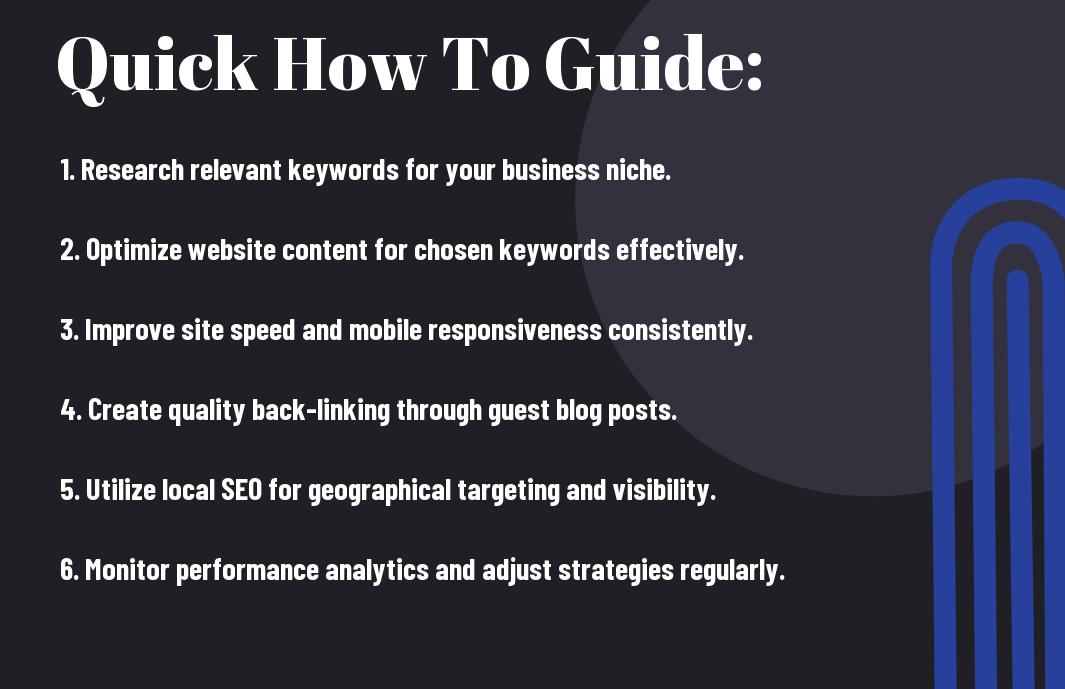You hold the key to unlocking the full potential of your small business through effective SEO strategies. This guide will equip you with important techniques to boost your online presence, attract more visitors, and eventually convert them into loyal customers. By focusing on optimizing your website’s content and structure, understanding keywords, and leveraging local SEO, you can gain an edge over your competitors. Don’t miss the opportunity to elevate your brand visibility and grow your business through proven SEO tactics that truly make a difference.
Key Takeaways:
- Understanding keyword research is vital; it helps identify the terms and phrases potential customers are using to search for products or services.
- On-page SEO practices, such as optimizing content, meta tags, and image descriptions, enhance website visibility and user experience.
- Building quality backlinks from reputable sources increases your site’s authority and improves search engine rankings.

Understanding SEO
To effectively boost your online presence, it’s imperative to understand the fundamentals of SEO. Search Engine Optimization (SEO) refers to a set of strategies designed to improve your website’s visibility on search engines like Google. By optimizing your site for relevant keywords and enhancing the overall user experience, you can attract more organic traffic and convert visitors into customers.
What is SEO?
The term SEO encompasses various techniques aimed at enhancing a website’s ranking in search engine results. This includes optimizing content, improving page speed, and building backlinks, all of which contribute to making your site more appealing to search engines and users alike.
Importance of SEO for Small Businesses
One significant advantage of implementing SEO is that it helps your small business stand out in a competitive market. By optimizing your online presence, you can effectively reach your target audience, drive organic traffic, and increase your chances of generating leads.
A strong SEO strategy can lead to higher visibility, which is imperative for attracting potential customers. Without effective SEO, you risk being overshadowed by competitors. Investing in SEO not only builds your reputation online but also can lead to increased sales and a loyal customer base. Additionally, it provides valuable insights into customer behavior and preferences, allowing you to tailor your marketing strategies for better results.
How-to Conduct Keyword Research
While effective SEO strategies start with understanding your audience, conducting thorough keyword research is vital for small businesses. This process helps you identify the terms your potential customers are using when searching online, enabling you to tailor your content and improve your rankings on search engines. By focusing on the right keywords, you can drive targeted traffic to your business and enhance overall online visibility.
Identifying Relevant Keywords
If you want to find the best keywords for your business, think about the words and phrases your target audience may use to find your products or services. Consider engaging with your customers to gain insight into their language and search habits, ensuring you select keywords that genuinely resonate with your market.
Tools for Effective Keyword Research
Howto leverage various tools to enhance your keyword research process? Utilize platforms like Google Keyword Planner, Ahrefs, or SEMrush, which can provide valuable insights into keyword volume, competition, and trends. These tools enable you to analyze various aspects of your chosen keywords, helping you strategize effectively and make informed decisions for your SEO efforts.
Research is key to your keyword strategy. Use Google Keyword Planner to discover search volume and competition levels. Additionally, tools like SEMrush can help you analyze your competitors’ performance, revealing keywords that are driving traffic to their sites. This information can positively impact your content strategy, allowing you to identify high-traffic opportunities while avoiding overly competitive keywords that may hinder your progress.
How to Optimize On-Page SEO
After you set the foundation for your website, it’s crucial to focus on on-page SEO optimization. This involves fine-tuning various elements on your webpages to enhance visibility and rank higher on search engines. By implementing effective on-page strategies, you can improve user experience and drive organic traffic to your business, setting you apart from competitors.
Title Tags and Meta Descriptions
Little attention is often given to title tags and meta descriptions, yet they are key components of your on-page SEO strategy. A well-crafted title tag should include your target keywords while remaining concise and compelling, encouraging users to click on your link. Similarly, your meta description should effectively summarize your content, enticing potential visitors to learn more. This not only helps with ranking but also enhances your overall click-through rate.
Content Optimization Techniques
Now that you understand the basics, let’s probe into effective content optimization techniques. Your content should be tailored to meet the needs of your audience while strategically incorporating relevant keywords. Incorporate header tags to break down sections, making it easier for both users and search engines to navigate. Also, utilize internal and external links to provide additional context, boosting the credibility of your information. Finally, ensure your content remains engaging and addresses users’ queries to enhance dwell time and reduce bounce rates, ultimately benefiting your SEO performance.
The quality and relevance of your content significantly influence your SEO rankings. By using a mix of relevant keywords and engaging writing styles, you can address your audience’s needs effectively. Make sure to update your content regularly to ensure it stays fresh and valuable to users. Utilizing techniques such as appropriate keyword placement, multimedia elements, and concise formatting will not only optimize your SEO but also create a better user experience, encouraging visitors to return to your site.
Tips for Building Backlinks
Unlike traditional marketing, effective backlinking requires a strategic approach. To successfully build your backlinks, consider the following tips:
- Create high-quality content that others want to link to.
- Engage in guest blogging to reach new audiences.
- Utilize social media to promote your website.
- Network with industry influencers for potential collaborations.
This way, you can significantly improve your site’s authority and visibility.
Importance of Backlinks
The role of backlinks in SEO cannot be overstated, as they are vital in determining your website’s ranking and credibility. Search engines view backlinks as votes of confidence from other sites, which helps enhance your search engine visibility and drive organic traffic.
Strategies for Earning Quality Backlinks
One effective strategy for earning quality backlinks is to develop relationships with relevant bloggers and website owners in your industry. This often opens doors for collaboration and increases the likelihood that they will share your content.
Backlinks can be powerful assets for your website, serving as a vote of confidence and assisting in your SEO efforts. To earn these quality backlinks, focus on producing exceptional content that naturally attracts links and show your expertise. Engaging with influencers and other sites can lead to opportunities for guest posts or collaborative projects. Additionally, you can use resource pages as targets; many sites welcome submissions of valuable content to include. By doing so, you can enhance your site’s authority and visibility, propelling your business to new heights.
How to Improve Local SEO
Not every small business realizes the significant impact that local SEO can have on their visibility and foot traffic. By prioritizing local search results, you increase your chances of attracting nearby customers actively looking for your services, ultimately driving sales and growth.
Google My Business Optimization
Improve your online presence by optimizing your Google My Business (GMB) listing. Ensure that your business information is complete and accurate, including your address, phone number, hours of operation, and business category. Regularly update your GMB profile with engaging photos and respond to customer reviews, enhancing your local search ranking.
Local Listings and Reviews
Improve your visibility in local search results by ensuring your business is listed in relevant online directories. Consistency in your NAP (Name, Address, Phone) across all platforms is vital for building credibility and trust with search engines. Encourage satisfied customers to leave positive reviews on platforms like Google and Yelp, as they can significantly influence potential customers.
With local listings, maintaining accuracy in your business information is key to avoiding customer confusion. As you gather positive reviews, your business gains credibility and attracts more customers. Engaging with both positive and negative reviews shows that you value customer feedback, creating a strong community presence. Moreover, listings on various directories can enhance your SEO efforts by increasing your visibility and authority in local searches.
Factors Influencing SEO Success
Your SEO success can be influenced by a variety of factors that work together to enhance your site’s visibility. Key components to consider include:
- Content Quality
- Keyword Optimization
- Backlink Profile
- Technical SEO
- User Experience
The effectiveness of your SEO strategies hinges on these elements working synergistically.
Technical SEO Considerations
Success in SEO requires attention to technical aspects that enable search engines to crawl and index your site effectively. This includes optimizing your site’s structure, ensuring fast load times, and implementing mobile-friendliness. These factors contribute to higher rankings and better visibility in search results.
User Experience and Engagement Metrics
For SEO to thrive, user experience and engagement metrics play a vital role in determining how visitors interact with your website. Factors such as bounce rate, average session duration, and pages per session directly indicate how engaging your content is to your audience.
Influencing your website’s user experience is imperative for retaining visitors and improving your SEO results. A low bounce rate indicates that users find your content valuable, while a high average session duration shows that they are engaged with your material. Additionally, having an intuitive navigation system enhances visitor satisfaction and encourages them to explore more pages on your site. Regularly analyzing these engagement metrics will pave the way for continuous improvement in your SEO strategy.
Conclusion
The effective SEO strategies outlined in this guide can significantly enhance your small business’s online presence. By implementing these tactics, you can improve your website’s visibility, drive more organic traffic, and ultimately boost your sales. Consistency and adaptability are key; as search engines evolve, so should your approach. Focus on quality content, engage with your audience, and leverage data analytics to refine your strategies. Your commitment to optimizing your online marketing efforts will set you apart in an increasingly competitive landscape.
Q: Why is SEO important for small businesses?
A: SEO, or Search Engine Optimization, is vital for small businesses because it increases their visibility online. With effective SEO strategies, small businesses can rank higher in search engine results, making it easier for potential customers to find them. This can lead to increased website traffic, higher conversion rates, and ultimately more sales. By optimizing their website content and utilizing targeted keywords, small businesses can compete with larger companies and attract a more relevant audience.
Q: What are some basic SEO strategies small businesses can implement?
A: Small businesses can start with several fundamental SEO strategies, including keyword research, optimizing their website’s on-page elements, and creating quality content. Conducting keyword research helps identify the terms potential customers are searching for, which can be used throughout website content. Optimizing on-page elements, such as title tags, meta descriptions, and header tags, can improve search visibility. Additionally, producing informative and engaging content regularly can enhance rankings and attract more visitors to the website.
Q: How does local SEO differ from general SEO, and why is it significant for small businesses?
A: Local SEO focuses on optimizing a business’s online presence to attract more customers from relevant local searches. For small businesses, this is particularly important as it helps them stand out within their community. Local SEO techniques include claiming and optimizing the Google My Business listing, ensuring consistency of NAP (Name, Address, Phone number) information across directories, and collecting customer reviews. By targeting local keywords and engaging with the local community online, small businesses can improve their visibility and connect with potential customers in their area.




